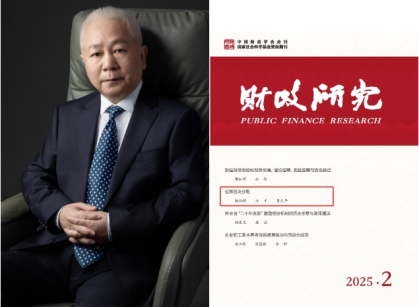
[Academic Journal] Public Finance Research, Issue 2, 2025.
[About the Author] Yang Canming, Professor, PhD in Economics, Honorary Doctorate of the Sapienza University of Rome, is the Former President and Vice Secretary of the CPC Committee of Zhongnan University of Economics and Law (ZUEL), and PhD Supervisor. Additionally, he is the Vice President of the Society of Public Finance of China, Vice Chairman of China Teaching Guidance Committee for Public Finance Majors of the Ministry of Education, a discipline expert on Expert Committee on Higher Education Philosophy and Social Sciences (Marxist Theoretical Research and Construction Projects) of the National Textbook Committee, one of the talents in National Talent Project, "Famous Cultural Talent" awarded by the Publicity Department of the CPC Central Committee, the talent of "the Four Batches" Talent Project, Member of the 8th Applied Economics Discipline Review Group of the State Council, one of the first talents in "New Century National Hundred, Thousand and Ten Thousand Talent Project", an expert of the "Program for New Century Excellent Talents in University" of the Ministry of Education, expert of the training program of the "Cross-century Qualified Disciplinary Leaders" by the Ministry of Finance, and expert with special allowances from the State Council. His research mainly focuses on basic fiscal theories and fiscal policies. He has led more than 20 national, provincial and ministerial level projects, including the Major Program of NSSFC, Major Program of Philosophy and Social Sciences Research of the Ministry of Education, Entrusted Program of the General Office of the CPC Central Committee, Program of NSSFC, Program of Fok Ying Tung Education Foundation of Ministry of Education, such as "Research for Promoting the Common Prosperity of All People", "Research on Regulating the Order of Income Distribution", "Research of Local Financial Behavior and Its Regularization", and "Research of the Chinese Government Procurement". The Public Finance of China compiled under his leadership was selected as one of the first Chinese economics textbooks. A number of his research reports have received important instructions from leaders at the provincial and ministerial levels or have been adopted by government departments. Yang has published more than 10 monographs and translations, including the Research on Regulating the Order of Income Distribution, Market Structure and Government Economic Behavior, and Fiscal Theory and Institutional Innovation. He has released over 160 academic papers in various important journals, including Social Sciences in China, Economic Research Journal, Journal of Management World, Finance & Trade Economics, Public Finance Research, and Economic Perspectives. More than 30 of his research results have been reprinted in Xinhua Digest, Chinese Social Science Digest, and Replicated Journal of the Information Center for Social Sciences of RUC. With his achievements, he has won over 20 important awards, such as the first prize of Outstanding Scientific Research Achievements Award of Higher Education Institutions of China, the second prize of the National Teaching Achievement Award for Higher Education, other national awards, the first prize of Excellent Achievements in Social Sciences of Hubei Province, the first prize of Development Research Award of Hubei Province, the first prize of Outstanding Research Achievements of the CPC Hubei Provincial Committee, the first prize of the Excellent Teaching Materials of the Ministry of Finance, the Soft Science Professional Research Award of China, and the ACCA Outstanding Achievement Award, among others. He was awarded the favorite president of university students.
[Main Views] Establishing a foundational income distribution system that facilitates the achievement of common prosperity is central to the policy focus of common prosperity. This paper first examines the analytical framework of the traditional third distribution system, highlighting its evident limitations in studying income and property ownership transfers based on bloodline and marital relationships, thereby revealing the incompleteness of existing theories. Therefore, this paper introduces the concept of the "fourth distribution." First, this paper establishes the rationale for the "fourth distribution" through ethical, sociological, and economic dimensions. Second, using household survey data, this paper demonstrates the practical significance of the "fourth distribution" in income and wealth allocation, as well as its moderating effects on income and wealth disparities. Finally, to promote common prosperity for all, this paper proposes the establishment of a "four-in-one" income distribution system that integrates market forces, government intervention, moral imperatives, and blood ties, and offers policy recommendations focused on digital fiscal and taxation development as well as reforms to the pension system.
